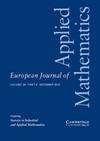Macroscopic limit of a Fokker-Planck model of swarming rigid bodies
IF 1.1
4区 数学
Q1 MATHEMATICS, APPLIED
引用次数: 0
Abstract
We consider self-propelled rigid bodies interacting through local body-attitude alignment modelled by stochastic differential equations. We derive a hydrodynamic model of this system at large spatio-temporal scales and particle numbers in any dimension蜂拥刚体的福克-普朗克模型的宏观极限
我们考虑的是通过随机微分方程模拟的局部身体-姿态排列相互作用的自推进刚体。我们推导了该系统在任意维度 $n \geq 3$ 的大时空尺度和粒子数下的流体力学模型。这一目标已经在维数 $n=3$ 或涉及跃迁过程的不同系统的任意维数 $n \geq 3$ 中实现。然而,与先前的工作相比,目前的工作在概念和技术上存在巨大差距。关键的困难在于确定一个辅助但重要的对象--广义碰撞不变式。我们通过使用旋转群的几何结构,即其最大环、卡坦子代数和韦尔群,以及表示论和韦尔积分公式的其他概念来实现这一目标。由此产生的流体力学模型是一个双曲系统,其系数取决于广义碰撞不变式。
本文章由计算机程序翻译,如有差异,请以英文原文为准。
求助全文
约1分钟内获得全文
求助全文
来源期刊
CiteScore
4.70
自引率
0.00%
发文量
31
审稿时长
>12 weeks
期刊介绍:
Since 2008 EJAM surveys have been expanded to cover Applied and Industrial Mathematics. Coverage of the journal has been strengthened in probabilistic applications, while still focusing on those areas of applied mathematics inspired by real-world applications, and at the same time fostering the development of theoretical methods with a broad range of applicability. Survey papers contain reviews of emerging areas of mathematics, either in core areas or with relevance to users in industry and other disciplines. Research papers may be in any area of applied mathematics, with special emphasis on new mathematical ideas, relevant to modelling and analysis in modern science and technology, and the development of interesting mathematical methods of wide applicability.

 求助内容:
求助内容: 应助结果提醒方式:
应助结果提醒方式:


